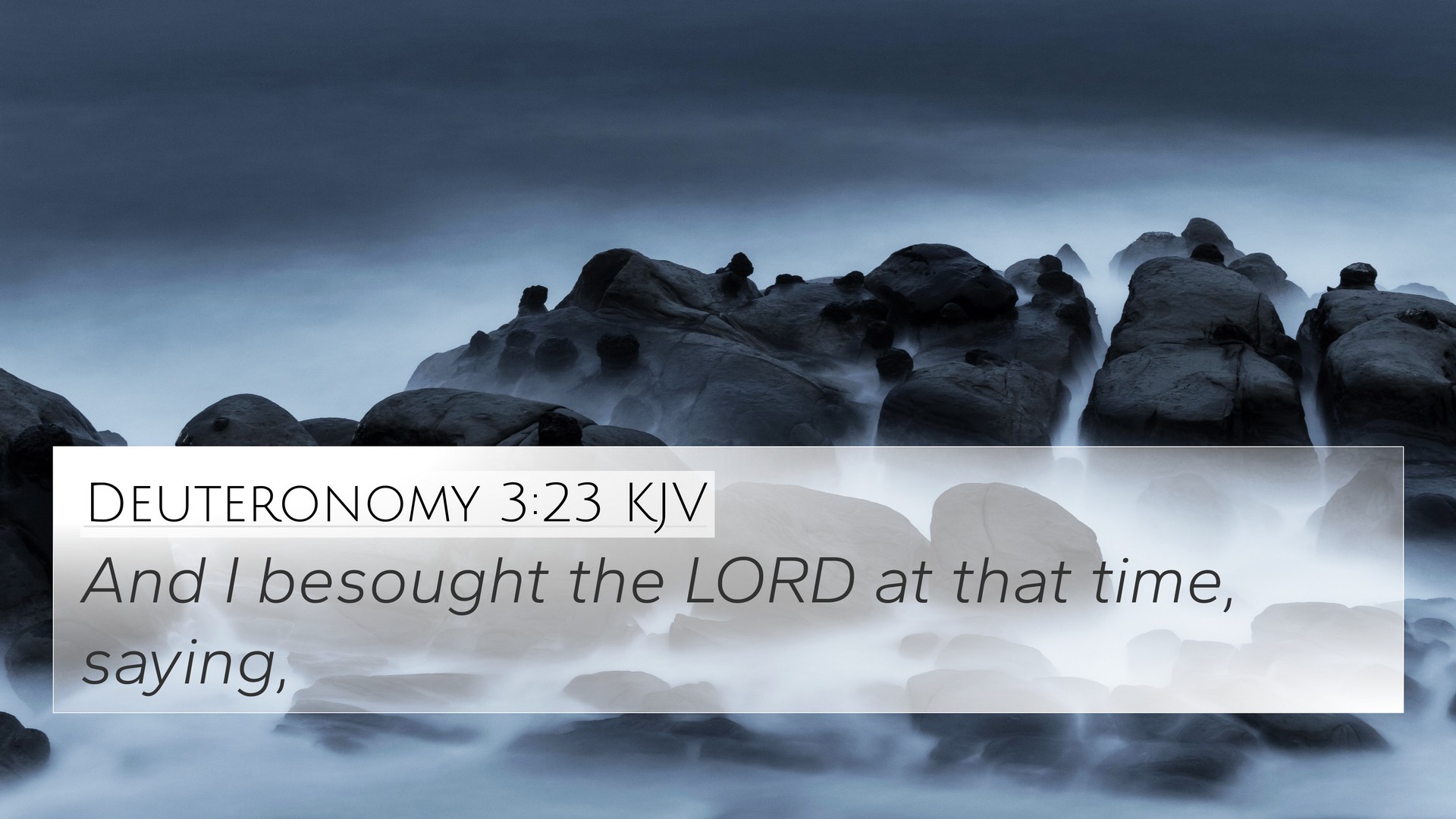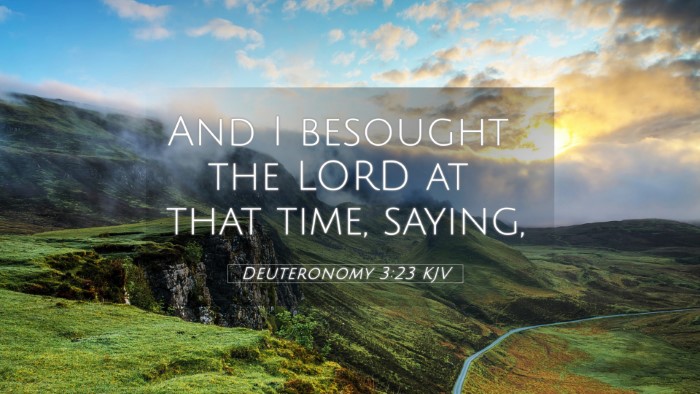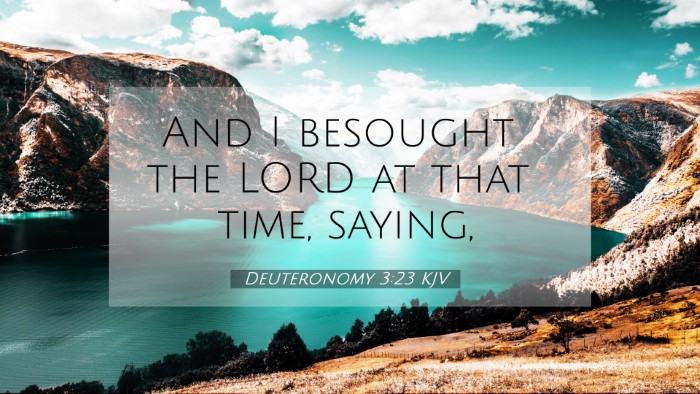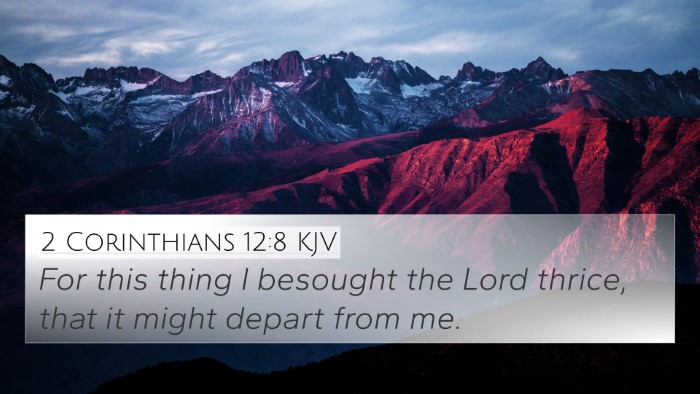Understanding Deuteronomy 3:23
Bible Verse: "And I besought the Lord at that time, saying,
In Deuteronomy 3:23, we encounter a moment of deep intercession by Moses as he pleads with God concerning his fate and desires to enter the Promised Land. This verse is not just a simple petition but rather an exploration of themes such as divine mercy, human desire, and the boundaries of God’s plans for His people. Let's delve deeper into the insights drawn from public domain commentaries to gain a more profound understanding.
Commentary Insights
-
Matthew Henry:
Henry highlights Moses’s earnestness in prayer, reflecting a moment where he seeks to understand God's will amidst personal disappointment. Moses represents a leader who deeply cares for his people, and his request exemplifies the human longing for fulfillment of God’s promises.
-
Albert Barnes:
Barnes focuses on the context of Moses's plea in relation to Israel's journey. He emphasizes that Moses's request was met with God's definitive answer, illustrating the sovereign will of God. This illustrates the importance of recognizing when God’s plans differ from our own desires.
-
Adam Clarke:
Clarke provides a historical context, noting Moses’s leadership role and the implications of God’s response. Clarke points out that this verse shows the relationship between divine providence and human pleading, emphasizing the necessity of aligning our desires with God’s greater purpose.
Thematic Connections
This verse reveals several crucial themes in Scripture, which resonate throughout both the Old and New Testaments. Here are some relevant connections:
- God's Mercy: The request of Moses serves as a reminder of God’s merciful nature, which is echoed in other scriptures like Numbers 14:18, where God is slow to anger and abounding in love.
- Intercession: Moses's plea parallels the intercessory role of Christ as seen in Romans 8:34, where Jesus intercedes for us.
- God’s Sovereignty: Similar to Isaiah 55:8-9, God's thoughts and ways are higher than ours, emphasizing that His plans are ultimately for our good.
- Faith and Obedience: Reflecting on Hebrews 11:30-31, faith in God's promises calls for obedience, even when our desires differ from His will.
- Leadership: Moses's leadership in this verse can be compared to 1 Peter 5:2-3, which encourages leaders to shepherd their flock willingly.
- Prayer and Thanksgiving: Echoed in Philippians 4:6-7, the importance of prayer in all circumstances aligns with Moses's heartfelt supplication.
- Longing for the Promised Land: The desire for entry into the Promised Land connects with Hebrews 4:1-11, emphasizing the rest that believers yearn for.
- Human Limitations: The reminder of how limits affect leaders, akin to James 4:13-15, where earthly plans are humble in light of God’s will.
- Hope and Promise: Relevant to Romans 15:13, where hope fills believers, acknowledging the ultimate promise of God’s eternal kingdom.
- Community and Collective Spirituality: Noted in Acts 2:42-47, Moses’s leadership reflects the communal aspect of faith and God's collective assurance for His people.
Cross-Referencing Biblical Texts
This examination of Deuteronomy 3:23 demonstrates that effective understanding of Scripture often requires engaging in cross-referencing Biblical texts. Here are some tools and methods to facilitate this:
- Bible Concordance: A reference book that lists words found in the Bible and includes verses that contain those words, aiding in finding connections.
- Bible Cross-Reference Guide: Useful for identifying related verses across different books of the Bible.
- Cross-Reference Bible Study Methods: Techniques to systematically explore the intricate relationships between texts.
- Comprehensive Bible Cross-Reference Materials: Resources that provide extensive links between verses, facilitating deeper studies.
- Identifying Connections between Old and New Testament: Tracing themes and messages that extend through the entirety of Scripture.
- Tools for Bible Cross-Referencing: Digital tools and apps that allow for easy navigation and connection of scriptural themes.
Conclusion
Deuteronomy 3:23 is a poignant reminder of the complexities of faith, leadership, and submission to God's will. Through an understanding of Moses's intercession, believers are encouraged to engage in fervent prayer, recognizing that God's plans may not align with their personal desires, yet still serve a greater purpose. By utilizing tools for cross-referencing and engaging with the broader scriptural context, one can deepen their understanding of biblical texts and expand their spiritual insights.



